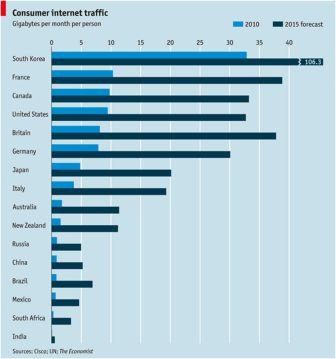Despite frequent protestations in some quarters that usage caps are somehow unfair or unneeded, one might argue that the caps not only are fair, but are needed, for any number of reasons. For starters, existing usage caps are an order of magnitude greater than a typical user ever requires.
So long as that headroom remains in place in the future, typical users (98 percent of all users) do not have to worry about exceeding their caps. Beyond that, there are lots of reasons for service providers to manage their networks.
Access bandwidth is not, contrary to opinion, easy or cheap to supply. In 2010, for example, Verizon’s (News  - Alert) financial return on invested capital was a negative one percent, according to Sanford Bernstein analysts Craig Moffett and Carlos Kirjner.
- Alert) financial return on invested capital was a negative one percent, according to Sanford Bernstein analysts Craig Moffett and Carlos Kirjner.
Also, as bandwidth consumption continues to climb, service providers will have to keep investing in additional capacity, a real cost that will be reflected, somehow, in retail prices. In principle, bandwidth services must bear some relationship to usage, as do electricity, water, natural gas and other services with a cost structure that is sensitive to usage.
That doesn’t mean broadband access is “best” sold on a fully-metered basis, as most consumers do not prefer that method. But buckets of usage are well understood and accepted. Broadband should fit into that scheme without much issue, from the standpoint of a typical consumer.
Of the 75 million broadband subscribers in the United States, around 42 million, or 56 percent, have some form of data cap, according to Leichtman Research Group. ISPs say the caps actually apply to less than two percent of the heaviest users.
Some policy advocates say the caps are a bad idea, but it never is completely clear why charging in some way related to consumption is seen as an inherently “bad” thing, given the size of the caps and the typical amount of data consumed by a household. Consider that Comcast (News  - Alert) has a cap of 250 Gbytes, AT&T DSL a 150 GByte cap and U-verse a 250 Gbyte cap.
- Alert) has a cap of 250 Gbytes, AT&T DSL a 150 GByte cap and U-verse a 250 Gbyte cap.
According to a study conducted by Ofcom, the average home broadband subscriber is consuming 17GB per month. U.K. data consumption
In 2009, U.S. households typically consumed about 11.4 Gbytes a month. U.S. data consumption In 2010, per capita consumption was about eight or nine Gbytes a month. If you assume 2.5 persons in a typical household, that works out to 22.5 Gbytes or less, per household.
In other words, the typical industry cap is about an order of magnitude greater than typical usage.

ISPs say they need the caps because access is a shared resource. Caps a good thing?
Craig Moffett, a senior analyst for research firm Stanford Bernstein, though, also argues that caps are a way to position retail pricing in ways that allow ISPs to build and operate networks on a profitable basis. Some people seem to have problems with that as well.
Perhaps another business reason for cable providers to cap data is to fend off competition from online TV competitors such as Netflix, which obviously benefit from pricing policies that make additional bandwidth payments a “no additional cost” item. Truly “unlimited” access plans would encourage people to shift to streaming, which arguably works against a cable, telco or satellite video provider’s business interests.
Also, over the long term, the one sustainable business an access provider can rely on is the Internet access business, as voice services, text messaging and someday video services become less important revenue sources.
Bandwidth caps are not an issue for all but several percent of consumers.
Gary Kim (News - Alert) is a contributing editor for TMCnet. To read more of Gary’s articles, please visit his columnist page.
Edited by Rich Steeves
